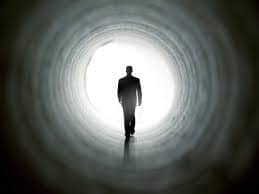
Human beings live in a world of assumptions. And yet, what is the main attribute of intelligence? It is to have the capacity to question one’s beliefs, rather than to remain a puppet of collective conditionings, preconceived notions, and dogmas. In many religions, faith is considered as virtue, but is it really? Having faith that Jesus died for your sins is not a virtue but a dramatic failure in discriminating between truth and falsehood. Humans are graced with having a more developed brain than animals, but how they use that brain is often undignified, displaying a lack imagination that is founded upon a cowardly desire to remain a comfortable part of the herd. Humans fear any resistance to social conditioning; they fear the unknown, fear facing up to truth, and in doing so, go against the basic principles of intelligence. This is why, in this article, we have chosen to question the notions present in the collective mind about life after death.
Our consciousness is deeply and inextricably tied to our human brain, and the unfathomably complex networks of neurons, hormones, and chemicals which constitute the activities of our brain and nervous system. When we contemplate the process of falling asleep, we see that even this radically changes the state of our consciousness –indeed, we entirely lose our ability to think consciously, to have controlled and intentional impact on our environment or upon our own thoughts, and entirely cease to cognize and recognize our surroundings. It really is extremely dramatic. So, can you imagine what would happen in the event of death, where our brain’s functionality ceases altogether?
Contemplating the idea of life after death from the point of view of having a true insight and sensitivity to the nature of our consciousness, makes it seems like quite a ridiculous notion. Where does the idea that, in death, we move to a new dimension while retaining the basic attributes of our past self, come from? The answer is quite simple – it comes from a combination of fear of death and of the unknown, basic ignorance, grief, and religious brainwashing. Realistically, a personality cannot possibly survive death. Rather, it is highly probable that, upon dying, our personality is completely disintegrated and no trace of it remains. To believe that we walk on to greet our deceased loved ones on ‘the other side’ is an illusion. It is a pure fabrication that arises from human fallibility and our inability to confront the abrupt cruelty of irreversible loss. We will not meet those who have died, because they are gone, non-existent, or at most dissolved back into universal energy, without the ability or power to ever reconstruct their sense of self.
This then begs the question, is there such a thing as reincarnation in any form? The answer is, both yes and no. There is such a thing as ‘selective reincarnation’, which points to the fact that only those very rare individuals who have managed to solidify their sense of self have the capacity to reincarnate.
Behind the concept of ‘selective reincarnation’ lies the understanding that, while the vast majority of people will cease to exist upon dying, those who are able to solidify an existentially significant sense of me in this lifetime, meaning, whose existence as me is clearly identifiable in separation from the mental and emotional fluctuations of personality, will go on to reincarnate. That solidified me, who is distinct from our psycho-somatic reality, is what we call our ‘pure subjectivity’. In order to actualize it, one must know oneself independently from one’s thoughts and emotions, the first realization of which is to meet the subjectivity of the person, the knower’s personal center of intelligence.
When we say that a solidified me will reincarnate, we are not saying that that such a person will be reborn as the same person. What will continue is their essence, their level of intelligence, and the degree to which their me has evolved. So, it’s different to what one might initially imagine. Such a person will not carry the memories of who they were in past lives, as has been suggested in past, largely naïve, theories of reincarnation. Rather, as we have said, their intelligence and essence of me, in its more advanced evolutionary stage, will have the capacity to resist the force of death and continue into a new incarnation. In that new incarnation, that person will have no psychological memory of who he was before – he will just know who he is now, on a higher level. As we continue existing, life continues to test how much we deserve our future evolution. If we fail, we will be erased, if we succeed, we will keep living eternally as the extension of god within us.
In our culture, there is a recognized phenomenon called ‘NDE’, or Near-Death Experience. What is interesting, is that what people encounter at this juncture between life and death is deeply culturally conditioned. In Western culture, it is Jesus who stands as a light at the end of a long tunnel, while in another culture, the person may see a vision of Buddha, or another imaginary deity, depending on their belief system. This shows us that such visions are pure imagination, the last programmed, mental impressions of a dying brain. There is no light at the end of the tunnel of death, or anything at all. There is just an ending, a final death. Upon the death of the body, everything vanishes. What remains, as we have said, is only the potential to reconstruct another being from the essence of me that has developed in the particular lifetime. In a way, this is not an act of cruelty by existence, but rather an act of mercy. People have lived in agony all their lives – why should they want to continue that agony into death?
People need to awaken to reality instead of living their imaginations, in false ideas born of fear and a refusal to confront the basic fact of death. If one has never existed in real way while in the body, how can one hope to exist without the body, which is the very vessel of our consciousness?
Even a brain tumor, or just the natural deterioration of the brain that happens in old age, can prevent a person from a forming a clear and coherent sense of self, making them totally scattered and unable to recognize who or where they are. So, what would happen if the brain were to entirely disintegrate? What is left to hold a person’s sense of self together? The answer is – nothing.
What about the phenomenon of so called ghosts and phantoms? Most of these things are more like dark beings, not humans. However, on rare occasions, the ego can develop a strong psychic energy, based on its neurosis, and extreme clinging to life and neurotic inability to let go, that has some capacity to continue in subtle ways, unable to let go. These are not human beings but distorted fragments of human psyche that refuse to cross over, back into nothingness; they do not go into heaven or hell, but live for time being in the astral plane of universal subconscious mind. You cannot be your human personality without the human body, but rather just a tragic fragment of it that refuses dissolution.
To summarize, upon our death, the only thing that remains is the essence of me and its evolution into self-actualization. If our me has not been solidified, that essence becomes annihilated upon the event of death. This means that the majority of humans have simply never existed before, neither will they go on to live again. However, if there is enough solidification, that essence of me will embody a new vessel, and reincarnate as an actual ‘being’, but in an entirely different vessel or form.
Blessings,
Aadi
For a definition of the terminology used, please visit the Glossary page. Click here for a printable version of this article.
